|
|
|
Sort Order |
|
|
|
Items / Page
|
|
|
|
|
|
|
| Srl | Item |
| 1 |
ID:
095427
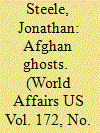

|
|
|
| 2 |
ID:
095428


|
|
|
|
|
| Publication |
2010.
|
| Summary/Abstract |
After the Black Hawk helicopter cleared the landing zone, a handful of young paratroopers from the elite 508th Parachute Infantry Regiment, 4th Brigade Combat Team, 82nd Airborne Division, walked a hundred yards to Forward Operating Base (FOB) Naw Bahar, Zabul Province, Afghanistan. The ninetheeth-century mudbrick fort stood out against the big sky; it was the tallest structure for miles around.
FOB Naw Bahar-justly nicknamed "FOB Nowhere"-is eight to thirteen hours by Humvee from any of the other population centers in Zabul Province. Given the threat of attack on Humvee convoys, American troops here travel by helicopter. The paratroopers who had just landed were some of the 764 soldiers commanded by Lieutenant Colonel David Oclander. It was late November 2009 and they had been operating in Zabul since late August. Their main mission was to advise the Afghan National Security Forces, the Afghan National Police (ANP), and Afghan National Army (ANA), but they were also conducting ground-level counterinsurgency missions.
|
|
|
|
|
|
|
|
|
|
|
|
|
|
|
|
| 3 |
ID:
095429
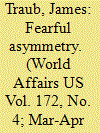

|
|
|
|
|
| Publication |
2010.
|
| Summary/Abstract |
In the first minutes of Israel's assault on Gaza on December 27, 2008, F-16s fired missiles into the police headquarters and three police stations, killing ninety-nine policemen (and nine civilians). Israel viewed Gaza's police as an ancillary wing of Hamas, the political and military force which governs Gaza, to be mobilized as soldiers in times of war. The wave of attacks thus constituted a preemptive strike at Hamas's military infrastructure. Israeli strikes would kill a total of 248 members of Gaza's police force in the course of the Cast Lead operation. But these men were, in fact, policemen; had Israel not invaded Gaza that day, many would have gone off to direct traffic and do the other things police officers do elsewhere. Were they civilians or were they combatants? The report of the U.N. Fact Finding Mission on the Gaza Conflict, known as the Goldstone Report (after Richard Goldstone, the South African jurist who served as chief investigator), concluded that the attack on the police stations violated principles of international humanitarian law, which require those who wage war to minimize harm to civilians. The report cites the attack as only one of many instances where the Israel Defense Forces (IDF) may have committed war crimes.
|
|
|
|
|
|
|
|
|
|
|
|
|
|
|
|
| 4 |
ID:
095433
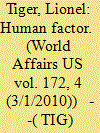

|
|
|
|
|
| Publication |
2010.
|
| Summary/Abstract |
It's hardly surprising that a sentient species such as ours would be attentive to its immediate environment. Nor is the extension of that immediacy to the planet overall difficult to understand: mankind has always been interested in nature for both practical and aesthetic reasons. It follows that the broad effort toward scientific explanation of the impact of people and systems on nature has supported what has become a global environmental movement, at least conceptually. And not only conceptually, because there have been repeated gatherings of concerned leaders intent on responding to current and future problems associated with environmental impact, such as warming trends and sea levels. Perhaps not since the Communist International has there been such a self-conscious and comprehensive effort to accomplish large-scale goals.
|
|
|
|
|
|
|
|
|
|
|
|
|
|
|
|
| 5 |
ID:
095432
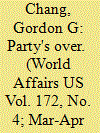

|
|
|
|
|
| Publication |
2010.
|
| Summary/Abstract |
n October 1 last year, China's Communist Party celebrated the country's National Day, marking the sixtieth anniversary of the founding of the People's Republic. As they did ten years before, senior leaders put on a military parade of immense proportions in their majestic capital of Beijing. Like the Olympic Games in 2008, the parade was a perfectly executed and magnificently staged spectacle, but instead of international fellowship, the theme was the power of China's ruling organization and the rise of the Chinese nation.
|
|
|
|
|
|
|
|
|
|
|
|
|
|
|
|
| 6 |
ID:
095430


|
|
|
|
|
| Publication |
2010.
|
| Summary/Abstract |
O n November 9, 2001, George W. Bush created a new public holiday-World Freedom Day. The United States, he explained, would lead the global fight for "liberty, freedom and the universal struggle for human rights"; it would try to help the "more than two billion people" still living under repressive regimes. The idea that America could, or should, do this had informed a certain kind of Washington mind-set throughout the Cold War. But after the Berlin Wall came down, freedom's crusaders increasingly set their eyes not so much on Communism as on violators of human rights in general. They unfurled the banner of humanitarianism and, righteously, scorned the cowards and skeptics who wanted to keep America's powder dry.
|
|
|
|
|
|
|
|
|
|
|
|
|
|
|
|
| 7 |
ID:
095431
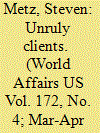

|
|
|
|
|
| Publication |
2010.
|
| Summary/Abstract |
When Congress approved a massive, five-year assistance package for Pakistan in the fall of 2009, much of it earmarked for strengthening the country's military and security forces, Pakistani leaders reacted by immediately biting the hand that was trying to feed them. During a talk in Houston, former President Pervez Musharraf slammed the conditions in the bill, asserting that Pakistan knew better than the United States how to root out terrorists. General Ashfaq Kiyani, the Pakistani army chief, labeled the offer of support "insulting and unacceptable." Members of the Pakistani parliament called the $7.5 billion appropriation "peanuts." Some of this grumbling may have been for show, another example of Pakistan's finely honed skill at extracting more and more money from the United States, but it also reflected a cynicism and sense of estrangement on the part of the Pakistani elites. And in this regard the episode highlights a central flaw in American security strategy: reliance on allies whose perceptions, priorities, values, and objectives tend to be quite different from our own.
|
|
|
|
|
|
|
|
|
|
|
|
|
|
|
|
| 8 |
ID:
095434


|
|
|
|
|
| Publication |
2010.
|
| Summary/Abstract |
The year is 2030 and four leaders-two military, two civilian-sit around a table at the White House or the Pentagon, perhaps, or at a military headquarters or embassy halfway around the world. One is an Army general, an infantryman by trade, who has spent his entire thirty-year-plus career rotating to and from the war zones of what was once called the Global War on Terror and then changed during the Obama administration to the more anodyne Overseas Contingency Operations. The second is an Air Force general, a former fighter pilot who has spent his recent years focusing on more conventional threats, among them how to deal with rogue states via airpower. The third is a Foreign Service officer who has spent much of his career engrossed in the political and economic side of irregular warfare, sometimes embedded with the military, other times manning a remote diplomatic outpost in some hostile precinct. The fourth is a more traditional political appointee: well educated and well connected, he has spent most of his career outside government, but very much inside the Washington world of policy debates.
|
|
|
|
|
|
|
|
|
|
|
|
|
|
|
|
|
|
|
|
|